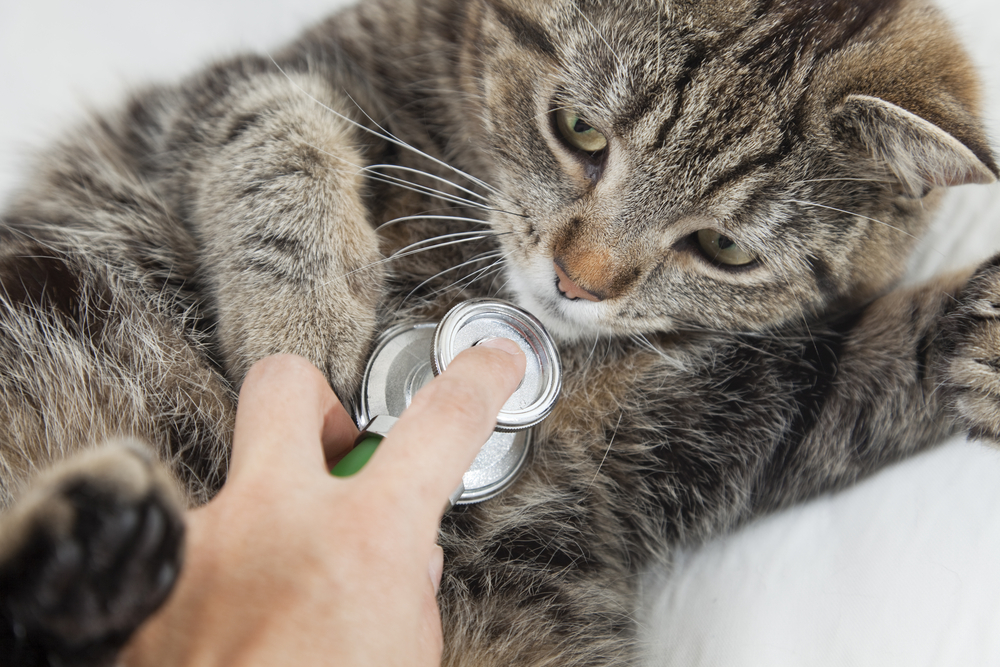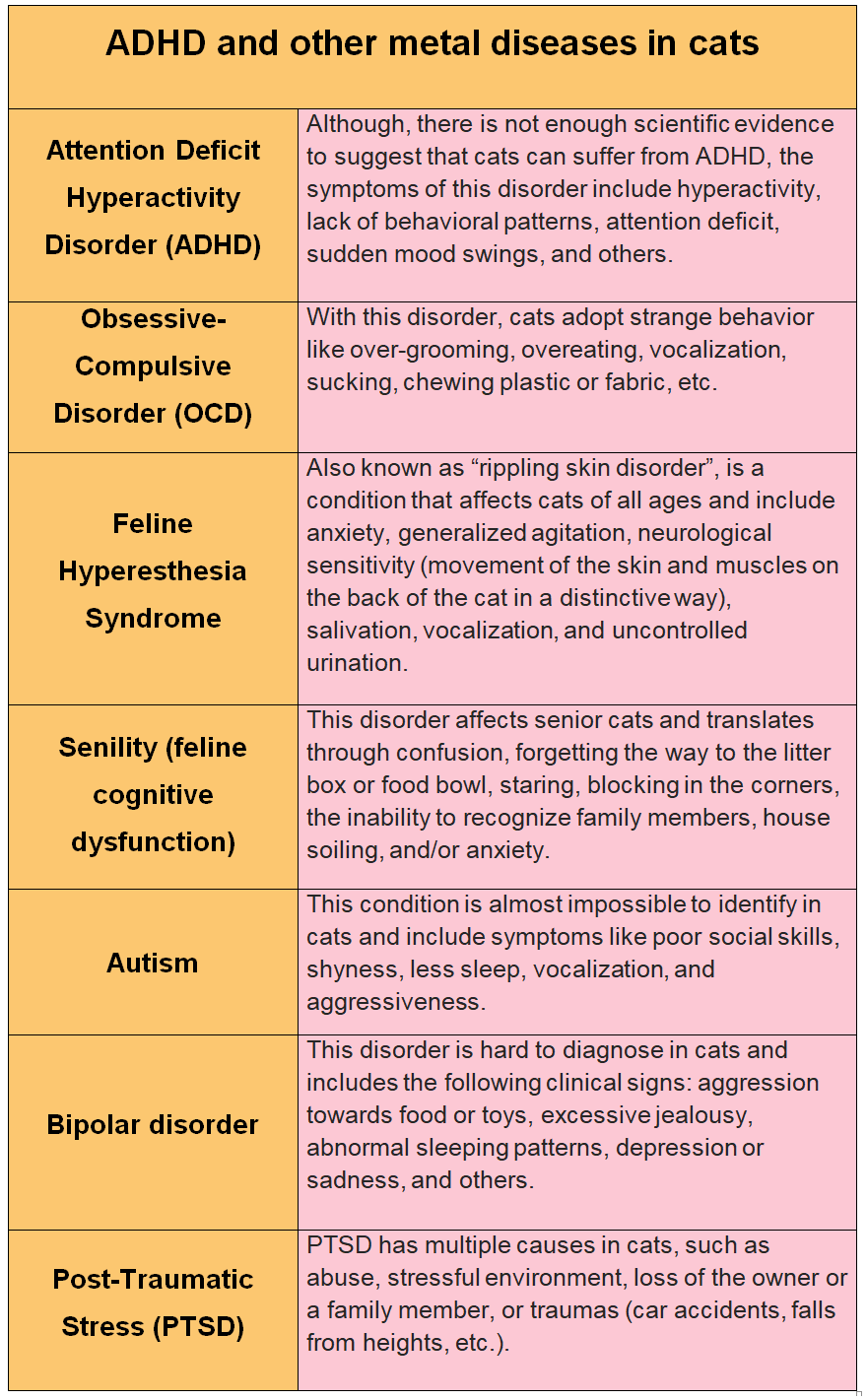
Unlike dogs, cats are very independent animals and less willing to please their owner. They will rarely come when they are called and, most of the time, cats will not answer when they hear their name.
If the cat forgets the way to the litter box or the food bowl, it is not a cause for concern unless it makes a habit out of it. But when your cat seems confused, does not coordinate its movements well, is disoriented, depressed, or even hyperactive, it is a good idea to visit your veterinary clinic.
In other words, any abnormal or awkward behavior that continues for more than 24 hours or that occurs more than once a week could be the result of a serious health problem. A neurological abnormality can only be diagnosed by a specialist.
Cats have a lot of energy, which is perfectly normal because they sleep/rest all day, and all of a sudden, as if out of the blue, our little felines start running around the house, acting like they are crazy– a phenomenon called “zoomies”, when pets burn the excess energy accumulated during the day.
ADHD or Attention Deficit Hyperactivity Disorder is a well-known condition in humans. In cats, this disorder is not fatal and does not have a name, often remaining undiagnosed, and includes symptoms like rapid mood swings, short attention spans, and periods when the cat can sleep and then behave impetuously.
Can cats suffer from mental illnesses?
Mental illness is defined by a wide range of disorders that affect thinking, behavior, and mood. In people, the most common mental disorders are schizophrenia, anxiety, depression, eating disorders, or addictive behaviors (alcohol, drugs, etc.).
As in humans, the most common mental illnesses in cats are represented by depression and anxiety.
Cats are territorial animals, and the environment in which they live is their “land”. If the territory where they feel safe is disturbed, depression and/or anxiety may set in. The cat’s territory can usually be perturbed by:
– The appearance of a new family member (newborn baby, boyfriend/girlfriend, husband/wife, etc.);
– The arrival of a new pet in the house;
– Moving to another location – depression and/or anxiety may also occur in cats if you move temporarily;
– There are certain triggers in the environment in which the pet lives: a lot of noise, too many people, etc.
Some specialists say that it is difficult to tell if a pet is suffering from a mental illness because there are no branches of veterinary medicine, animal behavior science, neuroscience, or wildlife to investigate these diseases. (1)
Other mental disorders found in cats are OCD (obsessive-compulsive disorder), FHS (feline hyperesthesia syndrome), senility, and trauma that causes mental illness.
OCD – This condition occurs in cats of all ages but usually starts in kittenhood. In this type of disorder, the cat adopts repeated, exaggerated behaviors, which do not seem to have a real purpose, such as over-grooming, until it irritates its skin or the hair falls off in that area, overeating, vocalization, licking/chewing plastic or fabric, sucking, etc.
Some Asian breeds, including Siamese cats are more prone to obsessive-compulsive disorder. To diagnose this illness, other conditions that may have common symptoms will be taken into account, such as skin infections, allergies, parasites, pain, skin cancer, thyroid problems, and others.There is also no cure for this condition, but it is not fatal, being kept under control with prescribed medication. (1, 2)
Feline Hyperesthesia Syndrome – This rare disorder occurs in cats of all ages but especially in adults. It is also called “rippling skin disorder” and causes the cat to react to physical stimuli that should not cause pain. It is manifested by the movement of the skin and muscles on the back of the cat in a distinctive way when it has painful episodes, salivation, vocalization, uncontrolled urination, etc. It is most commonly found in Siamese cats. The treatment is based on prescribed medication, and it is recommended not to stimulate the back area (by petting or scratching). (1)
Senility (FDS – feline cognitive dysfunction) – This disorder occurs in older cats (over 15 years) and is accompanied by clinical manifestations such as forgetting the way to the litter box or food bowl, confusion, staring, blocking in the corners, inability to recognize family members and acquaintances, house soiling, and/or anxiety. This condition is caused by the formation of beta-amyloid (a protein) deposits in the brain (as in Alzheimer’s disease in humans). The treatment is based on prescribed medications and mental stimulation with puzzle toys to keep the cat’s brain active. (1)
Traumas that causes mental illness are represented by car accidents, falling from an upper floor or great heights, or blows to the head.
Although physical injuries are often easy to treat, those in the brain remain there. These traumas can make the cat frightened, snort and spit out as if out of the blue, move oddly/unnaturally, shake its head, and others.
When it comes to ADHD, opinions are divided – some scientists argue that this condition exists in cats, while others say it doesn’t because they have no way of knowing if it is true ADHD or another condition with similar symptoms.
Is ADHD considered common in cats?
If your cat does not have any physical illness but has, for example, an obsessive fixation on grooming, it is easy to see and diagnose it with OCD.
An ADHD diagnosis, however, is not that simple. According to WebMD, people are often detected with ADHD only after they have exposed all the symptoms in a certain set (most of the time) over several months.(3)
As no studies have been performed on the symptoms of overactive cats over time, it is unclear which ones are the main indicators of this disorder. Therefore, it is not known whether cats can suffer from ADHD as it happens in humans.
Although in humans ADHD is recognized from an early age, in cats, this condition is difficult to observe in kittens because they are hyperactive in the first years of life, some continuing until the age of two years. However, as the cat gets older we will see that its desire to play and energy will decrease naturally.
Among the most active cat breeds are Abyssinian, Japanese Bobtail, Siamese, Bengal, Maine Coon, and others.
When it comes to gender, there is no connection between females and males, both of which can be equally affected by ADHD. The same goes for stray versus domestic (indoor) cats. Although, in stray cats it is hard to tell if they are suffering from ADHD because there is no one that can observe their behavior for long periods of time.
ADHD symptoms in cats

There is not enough scientific evidence to suggest that cats may suffer from ADHD; therefore, it is difficult to distinguish whether our pet has an attention deficit hyperactivity disorder, a hyperactive behavior, or other medical condition. For example, arthritis can also affect the cat’s behavior – the pet will show a lack of interest in various activities.
Among the most common ADHD symptoms we have:
- Hyperactivity – this trait is kept even if the cat is a senior – it will be energetic regardless of age.
- Lack of behavioral patterns such as eating, playing, sleeping, or going to the litter box.
- Attention deficit.
- The cat chooses when to come in your lap or when to snuggle – usually, cats that suffer from ADHD are the ones who choose the moment when they want to be affectionate.
- Sudden mood swings – in one moment you are quietly petting your cat, and in the next one, it bites and scratches you for no reason.
- Impulsivity – your cat changes quickly from one activity to another – now you play together, and in the next second, it goes to the food bowl, leaving the rest of the activities.
- Addictive personality – for example, cats can become obsessed with treats. Whether your cat is suffering from a medical condition or not, the treats should always be served in small quantities and from time to time!
- Your cat sleeps all day –it is best to write down your pet’s sleep routine and see if it is hyperactive at night. Cats with ADHD should be exhausted before they can relax enough to sleep.
- It loves the outdoor – the external environment presents a multitude of stimuli, and the cat’s primary instincts are activated – they follow and chase insects, birds, small rodents and reptiles. Give your cat time outside to help it consume its energy. If the cat can’t get out, a wide window is perfect for that.
- Hyperfocus – a cat with ADHD will make an extra effort to concentrate on something. For example, you may see your cat trying to focus on the toy when playing with it or when eating.
- Curiosity – this character trait is well-known to all cat lovers, but if your cat is extremely curious, then it may be suffering from ADHD. For example, if something smells unattractive and your cat will keep going to sniff that particular thing.
- Your pet does not listen – this happens when your cat is overstimulated and focused on several stimuli at once, which prevents it from concentrating.
- Lack of self-awareness – for example, a cat may beg you to give it food or treats, even if you just offered it – this leads to addictive behavior.
When it comes to cats, all of these symptoms may be related to the fact that they are hunters, are territorial, or live in a small space. For example, the classic symptoms of ADHD, such as hyperactivity, can actually be the result of stress being limited to a small area. This is especially true if the predatory instincts of the cat are not met.
Another thing worth mentioning is that cats have short attention spans, and it is hard to differentiate if your cat is not paying attention (attention deficit) or it’s just not interested in the activity.
The differences between ADHD and autism
In humans, autism is characterized by an impaired ability to establish normal social relationships. In addition, the capacity to communicate with others is affected, and repetitive patterns of behavior occur.
Children with ADHD have difficulty showing interest in the same thing for long periods of time, while those with autism may seem obsessed with the things they enjoy and have a hard time focusing on things that don’t appeal to them.
Autism is difficult to diagnose in people and it can be often misdiagnosed. In cats, this condition is almost impossible to identify.
Among the symptoms of autism in cats are poor social skills, cats usually sleep less or are active all night, are noisy (vocalize), are erratic and aggressive, may seem shy. Unfortunately, there is no way to know 100% whether cats suffer from autism or not, as is the case with ADHD.
Bipolar disorder and ADHD
As with ADHD and autism (in humans), bipolar disorder and ADHD often occur together. In humans, bipolar disorder is characterized by an imbalance of chemicals in the brain that causes short-tempered emotions.
In children diagnosed with ADHD, there is a risk of developing other disorders in adulthood, such as anxiety, depression, or bipolar disorder. Also, some symptoms are common to ADHD and bipolar disorder and can overlap, making them sometimes difficult to distinguish, such as impulsivity and attention deficit.
In cats bipolar disorder is pretty hard to diagnose, but the following symptoms could be associated with this mental illness:
- Aggression with toys, food, and/or while playing;
- Excessive jealousy;
- Abnormal sleeping routine;
- Over stimulation after eating – cats usually play for a while after their meal, but bipolar pets will go crazy after consuming food;
- Sadness or depression that doesn’t last long and happens after the cat is very excited. (4)
For a better understanding of these disorders, talk to your veterinarian!
Is ADHD dangerous for cats?

As in humans, ADHD in cats is not a fatal medical condition. Some little tips, along with the prescribed medication, can make your cat live as long and normal as possible. This disorder does not go away on its own and, it is only improved by treatment and a lot of care and love.
Here are some tips, which will help your cat accommodate with this condition:
– Play more with your cat – the pet must release the accumulated energy;
– If you can, let the cat outside or take it for a walk – the environment is full of stimuli that will help your cat release stress;
– Pay more attention to your feline- if you are busy all day, try to spend more time with your cat because the lack of attention can bother it mentally;
– Adopt a new pet – the arrival of a new member into the family can be very stimulating for your cat and will help it to release its energy;
– Spray feline pheromones around the house – this will help your cat relax;
– Administer the treatment prescribed by your doctor (if any).
! DO NOT give cats’ human ADHD medication, such as Adderall; they are toxic and even lethal to cats!
As for the diet, it should consist of healthy ingredients such as lean meat or fish rich in omega 3 fatty acids. Try to give your cat a quality and balanced diet, water at their discretion, and as few treats as possible!
Can ADHD lead to depression or other mental illnesses in cats?
People that suffer from ADHD are more prone to experience depression and anxiety, disorders that come from the fact that these persons take more risks, which will have consequences like problems at work, medical, financial or family issues.
When it comes to cats, it is impossible to say whether they can become anxious or depressed due to ADHD, but there is a possibility that they may overlap with the pre-existing medical condition.
ADD versus ADHD – which is worse?
ADD (Attention Deficit Disorder) and ADHD are included in the medical diagnosis of Attention Deficit Hyperactivity Disorder. In other words, ADD is part of ADHD.
Post-traumatic stress (PTSD) in cats
PTSD in cats has multiple causes, which can be triggered due to abandonment, abuse, stressful environment, loss of the owner, trauma caused by accidents (car, falling from a height, etc.), and others.
The most common symptoms in PTSD in cats are: increased attachment and the need to always be close to the owner (cats become needy or clingy), vocalizations, aggression, hypervigilance, agitation, decreased appetite, sudden changes in behavior, urinating and defecating elsewhere in the house, shyness, or sleep disorders. PTSD treatment in cats involves drug treatment, exercise, and play therapy.
Can cats have Down syndrome?
Down syndrome occurs when the genetic material of the fetus is copied incorrectly and results in an additional chromosome 21 (humans have 23 chromosomes).
Cats cannot suffer from Down syndrome because they have 19 chromosomes, but they may have Down syndrome-like symptoms, which include heart problems, hearing or vision loss, small or unusual ears, heavy or strange gait, low muscle tone, eyes widely spaced on the face, upturned eyes, wide nose, difficulty urinating and defecating.
Please Pin & Share!

Conclusions
Psychiatry and mental health is not a well-studied branch of veterinary medicine, and currently, the most common (popular) mental disorders in cats are anxiety and depression.
Regarding ADHD in cats, if you notice that your pet is more energetic than usual (hyperactive), has sudden mood swings, or has a lack of behavioral patterns, go with it to a veterinary check for a correct diagnosis.
Of course, certain factors need to be considered when diagnosing ADHD in cats, such as:
- animal age – kittens are much more energetic than adult cats, and the tendency to become distracted from activities is not surprising;
- cats that live in the house are more prone to hyperactivity because they are limited to a small space or their predatory instincts are not met.
Remember, ADHD is not a fatal medical condition, it can be kept under control with drug treatment (if necessary), exercise, interactive puzzles, a lot of care, patience, and love!
I hope this article answers all your questions about cats, ADHD, and other mental disorders!
Please Share Your Thoughts In The Comments Below!
Happy Cat Care!
References
